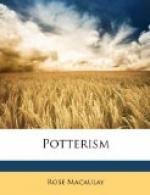‘Oh, you dear novelists!’ he said, and shook a finger at her.
’Nonsense, Percy. It is perfectly obvious. He used to be attracted by Clare, and now he is attracted by Jane. Very strange: such different types. But life is strange, and particularly love. Oh, I don’t say it’s love yet, but it’s a strong attraction, and may easily lead to it. The question is, are we to let it go on, or shall we head him back to Clare, who has begun to care, I am afraid, poor child?’
’Certainly head him back if you like and can, darling. I don’t suppose Babs wants him, anyhow.’
’That is just it. If Jane did, I shouldn’t interfere. Her happiness is as dear to me as Clare’s, naturally. But Jane is not susceptible; she has a colder temperament; and she is often quite rude to Oliver Hobart. Look how different their views about everything are. He and Clare agree much better.’
’Very well, mother. You’re the doctor. I’ll do my best not to throw them together when next Hobart comes over. But we must leave the children to settle their affairs for themselves. If he really wants fat little Babs we can’t stop him trying for her.’
‘Life is difficult,’ Lady Pinkerton sighed. ’My poor little Clare is looking like a wilted flower.’
’Poor little girl. M’m yes. Poor little girl. Well, well, we’ll see what can be done.... I’ll see if I can take Janet home for a bit, perhaps—get her out of the way. She’s very useful to me here, though. There are no flies on Jane. She’s got the Potter wits all right.’
But Lady Pinkerton loved better Clare, who was like a flower, Clare, whom she had created, Clare, who might have come—if any girl could have come—out of a Leila Yorke novel.
‘I shall say a word to Jane,’ Lady Pinkerton decided. ’Just to sound her.’
But, after all, it was Jane who said the word. She said it that evening, in her cool, leisurely way.
’Oliver Hobart asked me to marry him yesterday morning. I wrote to-day to tell him I would.’
7
I append now the personal records of various people concerned in this story. It seems the best way.
PART II:
TOLD BY GIDEON
CHAPTER I
SPINNING
1
Nothing that I or anybody else did in the spring and summer of 1919 was of the slightest importance. It ought to have been a time for great enterprises and beginnings; but it emphatically wasn’t. It was a queer, inconclusive, lazy, muddled, reckless, unsatisfactory, rather ludicrous time. It seemed as if the world was suffering from vertigo. I have seen men who have been badly hit spinning round and round madly, like dancing dervishes. That was, I think, what we were all doing for some time after the war—spinning round and round, silly and dazed, without purpose or power. At least the only purpose in evidence was the fierce quest of enjoyment, and the only power that of successfully shirking facts. We were like bankrupts, who cannot summon energy to begin life and work again in earnest. And we were represented by the most comic parliament that ever sat in Westminster, upon which it would be too painful here to expatiate.




